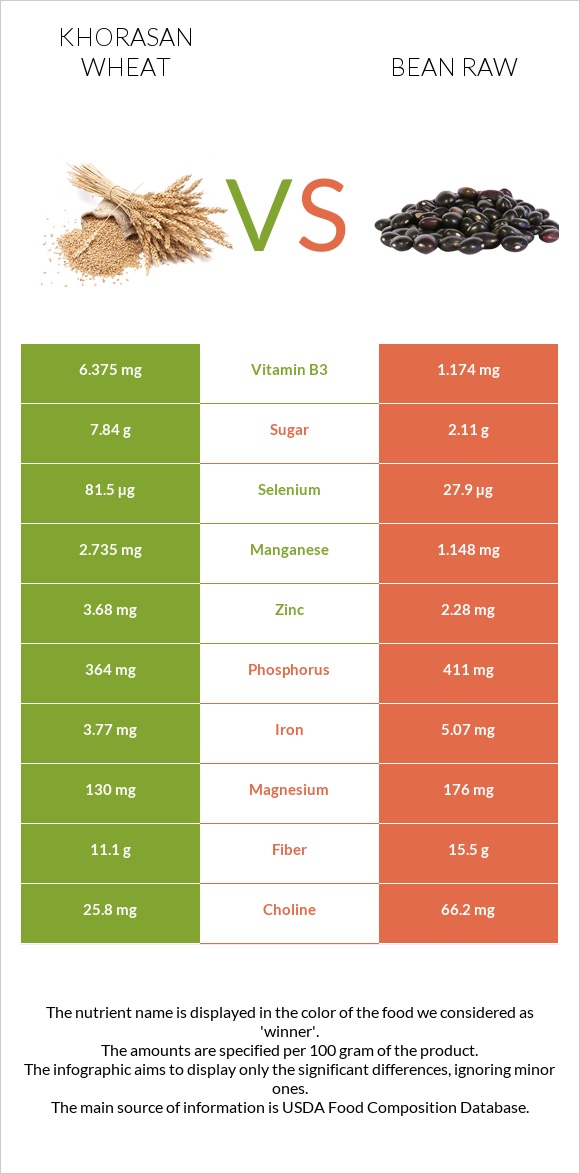Khorasan wheat vs. Bean raw — In-Depth Nutrition Comparison
Compare
Significant differences between khorasan wheat and bean raw
- Khorasan wheat has more selenium, manganese, vitamin B3, and zinc; however, bean raw is richer in copper, potassium, fiber, vitamin B6, iron, and vitamin B1.
- Khorasan wheat covers your daily selenium needs 97% more than bean raw.
- Bean raw has 5 times less vitamin B3 than khorasan wheat. Khorasan wheat has 6.375mg of vitamin B3, while bean raw has 1.174mg.
Specific food types used in this comparison are Wheat, KAMUT khorasan, uncooked and Beans, pinto, mature seeds, raw.
Infographic

Infographic link
Mineral Comparison
Mineral comparison score is based on the number of minerals by which one or the other food is richer. The "coverage" charts below show how much of the daily needs can be covered by 300 grams of the food.
| Contains more ZincZinc | +61.4% |
| Contains less SodiumSodium | -58.3% |
| Contains more ManganeseManganese | +138.2% |
| Contains more SeleniumSelenium | +192.1% |
| Contains more MagnesiumMagnesium | +35.4% |
| Contains more CalciumCalcium | +413.6% |
| Contains more PotassiumPotassium | +245.7% |
| Contains more IronIron | +34.5% |
| Contains more CopperCopper | +76.5% |
| Contains more PhosphorusPhosphorus | +12.9% |
Vitamin Comparison
Vitamin comparison score is based on the number of vitamins by which one or the other food is richer. The "coverage" charts below show how much of the daily needs can be covered by 300 grams of the food.
| Contains more Vitamin AVitamin A | +∞% |
| Contains more Vitamin EVitamin E | +190.5% |
| Contains more Vitamin B3Vitamin B3 | +443% |
| Contains more Vitamin B5Vitamin B5 | +20.9% |
| Contains more Vitamin CVitamin C | +∞% |
| Contains more Vitamin B1Vitamin B1 | +26% |
| Contains more Vitamin B2Vitamin B2 | +15.2% |
| Contains more Vitamin B6Vitamin B6 | +83% |
| Contains more Vitamin KVitamin K | +211.1% |
All nutrients comparison - raw data values
| Nutrient |  |
 |
DV% diff. |
| Folate | 525µg | 131% | |
| Selenium | 81.5µg | 27.9µg | 97% |
| Manganese | 2.735mg | 1.148mg | 69% |
| Copper | 0.506mg | 0.893mg | 43% |
| Vitamin B3 | 6.375mg | 1.174mg | 33% |
| Potassium | 403mg | 1393mg | 29% |
| Fiber | 11.1g | 15.5g | 18% |
| Vitamin B6 | 0.259mg | 0.474mg | 17% |
| Iron | 3.77mg | 5.07mg | 16% |
| Protein | 14.54g | 21.42g | 14% |
| Zinc | 3.68mg | 2.28mg | 13% |
| Vitamin B1 | 0.566mg | 0.713mg | 12% |
| Magnesium | 130mg | 176mg | 11% |
| Calcium | 22mg | 113mg | 9% |
| Starch | 52.41g | 34.17g | 8% |
| Vitamin C | 0mg | 6.3mg | 7% |
| Phosphorus | 364mg | 411mg | 7% |
| Choline | 25.8mg | 66.2mg | 7% |
| Carbs | 70.58g | 62.55g | 3% |
| Vitamin E | 0.61mg | 0.21mg | 3% |
| Vitamin B5 | 0.949mg | 0.785mg | 3% |
| Vitamin K | 1.8µg | 5.6µg | 3% |
| Vitamin B2 | 0.184mg | 0.212mg | 2% |
| Calories | 337kcal | 347kcal | 1% |
| Fats | 2.13g | 1.23g | 1% |
| Polyunsaturated fat | 0.621g | 0.407g | 1% |
| Net carbs | 59.48g | 47.05g | N/A |
| Sugar | 7.84g | 2.11g | N/A |
| Sodium | 5mg | 12mg | 0% |
| Vitamin A | 1µg | 0µg | 0% |
| Trans fat | 0.005g | 0g | N/A |
| Saturated fat | 0.196g | 0.235g | 0% |
| Monounsaturated fat | 0.213g | 0.229g | 0% |
| Tryptophan | 0.13mg | 0.237mg | 0% |
| Threonine | 0.442mg | 0.81mg | 0% |
| Isoleucine | 0.566mg | 0.871mg | 0% |
| Leucine | 1.112mg | 1.558mg | 0% |
| Lysine | 0.416mg | 1.356mg | 0% |
| Methionine | 0.251mg | 0.259mg | 0% |
| Phenylalanine | 0.772mg | 1.095mg | 0% |
| Valine | 0.687mg | 0.998mg | 0% |
| Histidine | 0.379mg | 0.556mg | 0% |
| Fructose | 0.11g | 0g | 0% |
| Omega-3 - ALA | 0.048g | N/A |
Macronutrient Comparison
Macronutrient breakdown side-by-side comparison
Protein:
14.54 g
Fats:
2.13 g
Carbs:
70.58 g
Water:
11.07 g
Other:
1.68 g
Protein:
21.42 g
Fats:
1.23 g
Carbs:
62.55 g
Water:
11.33 g
Other:
3.47 g
| Contains more FatsFats | +73.2% |
| Contains more CarbsCarbs | +12.8% |
| Contains more ProteinProtein | +47.3% |
| Contains more OtherOther | +106.5% |
~equal in
Water
~11.33g
Fat Type Comparison
Fat type breakdown side-by-side comparison
Saturated fat:
Sat. Fat
0.196 g
Monounsaturated fat:
Mono. Fat
0.213 g
Polyunsaturated fat:
Poly. Fat
0.621 g
Saturated fat:
Sat. Fat
0.235 g
Monounsaturated fat:
Mono. Fat
0.229 g
Polyunsaturated fat:
Poly. Fat
0.407 g
| Contains less Sat. FatSaturated fat | -16.6% |
| Contains more Poly. FatPolyunsaturated fat | +52.6% |
~equal in
Monounsaturated fat
~0.229g
Carbohydrate type comparison
Carbohydrate type breakdown side-by-side comparison
Starch:
52.41 g
Sucrose:
0.55 g
Glucose:
0.62 g
Fructose:
0.11 g
Lactose:
0 g
Maltose:
6.56 g
Galactose:
0 g
Starch:
34.17 g
Sucrose:
1.98 g
Glucose:
0.13 g
Fructose:
0 g
Lactose:
0 g
Maltose:
0 g
Galactose:
0 g
| Contains more StarchStarch | +53.4% |
| Contains more GlucoseGlucose | +376.9% |
| Contains more FructoseFructose | +∞% |
| Contains more MaltoseMaltose | +∞% |
| Contains more SucroseSucrose | +260% |
~equal in
Lactose
~0g
~equal in
Galactose
~0g